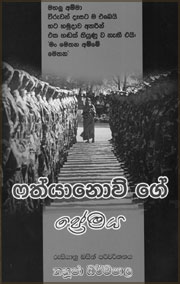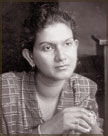|
DAILY NEWS ONLINE |
|
|
|
OTHER EDITIONS |
|
|
|
OTHER LINKS |
 |
Focus on booksRussian poems on love and war in Sinhala
|
|
|
To be honest I had not read any of Fatyanov's poems either in English or in translated form in Sinhala. (But most other names like Mayakovsaky, Lermentov , Pushkin and Anna Akhmatova come as household names).
I made enquiries to find that though the poet is known to Russian scholars in the capacity of a lyric writer and a poet the works have not been translated so far into Sinhala. So this I found is the primary and original effort where the poet is introduced via his creations to the local reader.

In her short introduction perhaps a common reader would have preferred to know more about Fatyanov by way of an introduction to the collection of present poems titled as Fatyanovge Premaya, (Godage 2005) the translator Tanuja Dharmapala has devoted more time perhaps over the translation part rather than the introduction of the poet by way of a conventional introduction.
But in some ways the short introduction holds good by way of knowing that the poet belongs to the post revolution period of Russian history, that is to say after 1917 and the poet Fatyanov was born on March 17, 1919 and commenced his creations round about the 1930s as a pacifist and nationalist, who was loved and greatly admired by his fellow folk all round the country.
This fact is visualized in his poetic creations which (in translation) are highly sensitive and full of life captured and expressed to suit the people of the entire gamut of war torn world and not to a single nation.
The poet Fatyanov had been a source of inspiration to his contemporary poets and songsters as his poems have been rendered by musicians as lyrics for their songs and sung in various places where people gather. Tanuja Dharmapala as the translator has introduced fifty two of his poems.
In all the poems we see a poetic persona, who is a soldier in various guises on his way to the battle field or returned from the regiment to relax for the rest of his life time in peace and harmony.
Recurrent theme
The recurrent theme is love in its various forms. Even in his duties as an army officer, he recalls his love life in its most humane manner. He sees the changing seasons and weather in its manifold ways but the unchanging manner of his deep-rooted love and affectionate attachment to humans. The poems are sometimes numbered like the paintings in an art gallery.
The poem number three which is titled as 'one dear word' (Dayabara Vadanak) is a sensitive piece recalling the memorable events about an affectionate ageing teacher named Valentina Pavlova, who had served her lifetime for the sake of teaching the pupils with the utmost loving kindness remembered by them as the lasting gift.
The poet says he wishes to send a message to his teacher who has never demanded anything from them and hopes to send her a message of best wishes from the battle front. He also recollects that it is only to her premises that they as youth never entered to pick apples.
Furthermore she is remembered as a mother to those who did not have their own mothers. Then the poet says: 'We grew up, we became strong, we left the village, we had to leave her, and the war came, and we had to go to the battlefront, but she continued to send us letters to the battle front'.
We got her letters as the war abated/We decided to send her a long letter/We decided to get together and write a long letter/But it was a just a decision never put into action/The reason being the war once again.'
Then the poet says which is the moment of illumination. 'In our small village one sees blizzards/They come incessantly. In this village of ours in the night one could hear an owl cry continuously' (P. 4-5).
Love poem
There is yet another love poem (No. 52) which in content resembles some of the poems of the well-known Russian poetess Anna Akhmatova. But I see that the poetic structure of Fatyanov is lighter and for the most part resembles a sonnet or a lyric.
The poet is seen addressing his beloved as she had sent a letter which is an inspiring message that forces him internally to conquer the enemy camp in order to see her once again.
He says 'When I receive your letters I feel once again the worth of the life with your smile that entrapped me/That intimacy in the fondness in all its varieties sunshine, sky and the earth beloved/I will walk on to the enemy front/As I get inspired by the hundreds and thousands of kisses planted on your sanctified cheeks/For the sake of this sunshine/For the sake of this wind / For the sake of this earth. And for the sake of both of us' (P. 79).
From another point of view, the poet Fatyanov is expressive of an all pervading spiritual sense, which encircles all forms of love.
In his poem titled Vasanavantha Mawatha (the lucky path) (P. 45) he attempts to recreate a path that is untrodden so far and should be visualized as a path of great way to the nobler life where people meet each other devoid of any animosity and ill will hatred and cruelties.
When once this path is created there will be flowers on either side to greet us. The reader visualizes a symbolic path that leads to a better life, which is anticipated by any living being living anywhere on the globe.
Fatyanov recreates the commonplace occurrences surrounding the workers, like factories, meeting places, glory of a better place to live, snow falls, nocturnal life in Moscow, on remembering the sweetheart, who lived in the village before the soldier's departure to the battlefield, (P. 13) the return trip of soldiers after the war (written in the form of a playlet or a series of dialogues) (see page 29) transience and the dawn of the inevitable but acceptable old age (P. 34) on watching the sea, (P. 61) the death of the affectionate comrades (P. 63).
Thought patterns
These poems have to be read several times in order to grasp the thought patterns and experience gone into the creative process. The will to live and help build a better place to live is the key tone in all the poems.
I feel that the attempt on the part of Tanuja Dharmapala as the translator, will help build a better climate of poetic creations enabling a cross cultural understanding pertaining to the humanistic frame of creativity.
One remarkable point is that these poems could be read as originals, as there is a possibility for a reader to misunderstand the subtle nuances embedded in each poem perhaps due to cultural barriers. That barrier is transcended by the translator as a result of the skilful use of diction.
It is stated by critics of literature like Lionel Trilling, that the most productive genre to have emerged from post-revolution era in Russia is poetry. This collection bears ample testimony to that comment.
..................................
|
|

